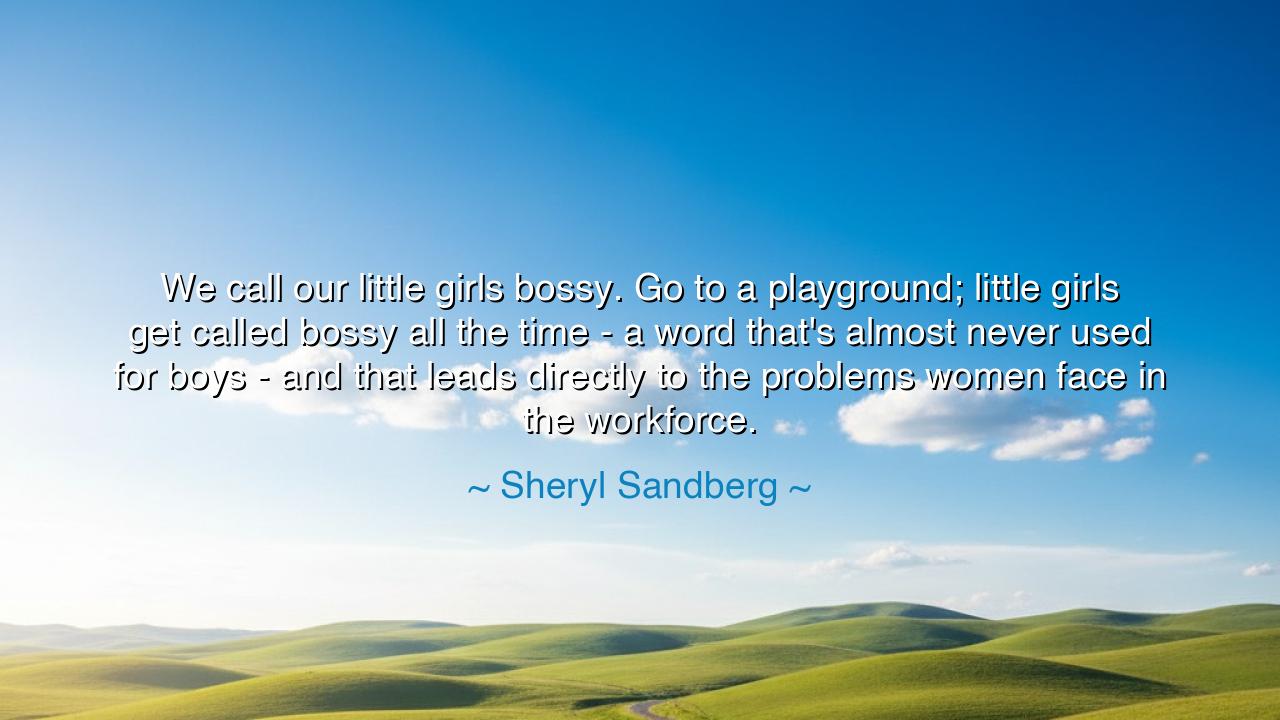
We call our little girls bossy. Go to a playground; little girls
We call our little girls bossy. Go to a playground; little girls get called bossy all the time - a word that's almost never used for boys - and that leads directly to the problems women face in the workforce.






Hear, O children of wisdom, the clear and cutting words of Sheryl Sandberg: “We call our little girls bossy. Go to a playground; little girls get called bossy all the time—a word that’s almost never used for boys—and that leads directly to the problems women face in the workforce.” This is no idle observation, but a revelation of how power is shaped from childhood. In it she names the subtle chains that bind women: the judgments, the words, the labels that train them to shrink from leadership before they have even begun to grow.
For the word bossy is not innocent. It is a dagger hidden in laughter, used not to correct cruelty, but to shame confidence. When a boy takes charge, he is called strong, decisive, a leader. When a girl does the same, she is told she is bossy, difficult, unfeminine. Thus, from the playground to the boardroom, society teaches girls that to lead is to risk rejection, and so it dampens their fire before it can blaze.
History bears witness to this pattern. Recall Elizabeth I of England, who was called imperious, cold, and unfeminine for ruling as no woman was expected to rule. Yet her strength preserved her nation through storms of war and division. She was accused of being “bossy,” though history now names her powerful. So too with countless women whose leadership was disguised as defiance, until time revealed it as vision.
Sandberg’s words remind us that the workplace struggles of women do not begin at the office, but in childhood, when words shape identity and courage. A girl told too often that she is bossy will learn to silence herself. A girl told that her leadership is unwelcome will grow into a woman who hesitates to speak. And in that hesitation, the world loses not only her voice but the progress it might have brought.
Therefore, O children of the future, learn this truth: words are seeds. To call a girl bossy is to plant shame; to call her a leader is to plant courage. If the world is to see women rise freely into positions of strength, it must begin by naming their confidence rightly, by cherishing their voices rather than silencing them. For the future of justice lies not only in laws, but in the lessons whispered on the playground.






DMTrong Dao Minh
Sheryl Sandberg’s point about how little girls are labeled as ‘bossy’ while boys are not challenges the way society views assertiveness in women. This unequal treatment starts early, but can we unlearn these harmful behaviors? How do we ensure that leadership qualities in young girls are celebrated instead of being criticized? What steps can we take to ensure that girls are empowered to step into leadership roles without the fear of being labeled negatively?
GGGhe Ghe
Sandberg’s observation about the term ‘bossy’ raises important questions about how language reinforces gender stereotypes. How does the consistent use of this label impact a girl’s self-perception and her potential to lead? Do we need to reframe how we teach both boys and girls about leadership qualities? Could changing this one term, and how we apply it, have a profound impact on gender equality in the workplace?
NLNguyen danh Ngoc lam
The idea that girls are called ‘bossy’ for traits that boys are often praised for highlights a significant double standard. Is it possible that these early labels shape a woman’s confidence in leadership roles later in life? How do we as a society start to break this cycle? Should we be teaching young girls that taking charge is not only acceptable but celebrated, and that it’s okay to be assertive and confident?
PDPham Duc
Sandberg’s statement about little girls being labeled as ‘bossy’ brings attention to how gendered expectations shape behavior from a young age. When boys display similar behavior, they’re often praised as leaders, while girls are discouraged. How much of the gender inequality in the workplace can be traced back to these early socialization experiences? Should we challenge the way we label young girls to break this cycle and encourage them to embrace leadership without fear of judgment?